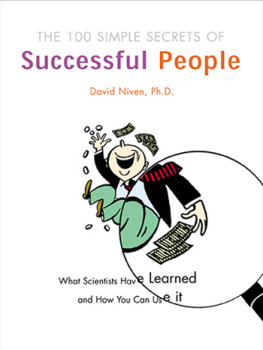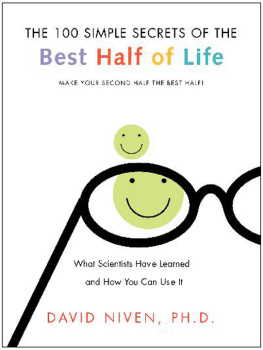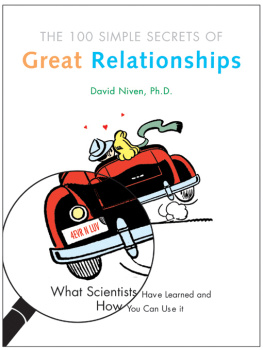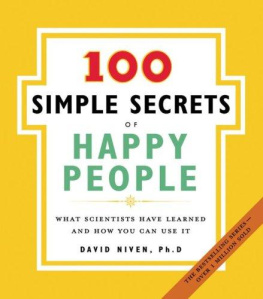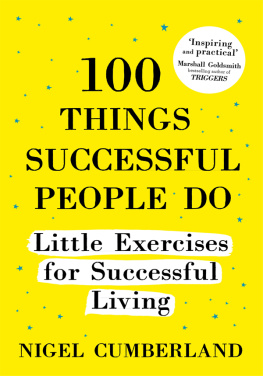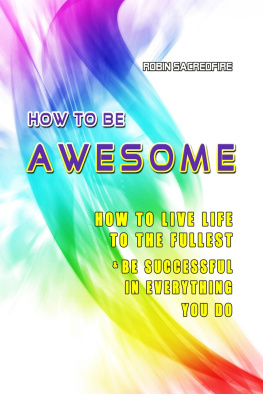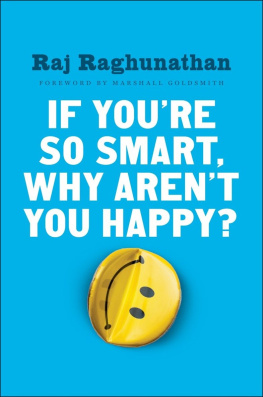THE 100 SIMPLE SECRETS OF
Successful People
What Scientists Have Learned
and How You Can Use It

David Niven, Ph.D.

Contents
Competence Starts with Feeling Competent
Its Not How Hard You Try
Creativity Comes from Within
Take Small Victories
You Cant Force Yourself to Like Broccoli
Resist the Urge to Be Average
There Is Plenty of Time
Its Never Just One Thing
Dont Keep Fighting Your First Battle
Change Is Possible, Not Easy
Seek Input from Your Opposites
Write Down the Directions
Anticipate Irrationality
The Best Defense Is to Listen
Winners Are Made, Not Born
Do Things in Order
Get Experience Any Way You Can
Self-Motivation Works Once
Speak Slowly
Where You Stand Depends on Where You Look
Use Your Own Self-Interest
Remember Who You Are and Where You Are
Negotiate with Confidence, or Dont
Volunteer to Feel Better
Remember the Task, Forget the Rankings
Avoid the Second-Guess Paralysis
Seek a Tall Plateau, Not the Peak
Play the Odds
The Past Is Not the Future
Get a Good Nights Sleep
It Starts and Ends with You
Notice Patterns
Efficiency in Everything
Tomorrow Will Be a Better Day (But How Exactly?)
Lessons Cant Threaten
Success Is Formula, Not Fantasy
You Need to Know More Than Just How Talented You Are
Role Models Are Not One Size Fits All
Learn from Losses
Embrace Work; It May Have to Last Forever
Exercise and Eat Right
Boredom Is the Enemy
Be Clear About Your Role in the Outcome
Make Change Count
Listening Is More Than Not Talking
Take Off Your Blinders
Youll Get What Youre Afraid Of
Think About Who You Ought to Be
Leadership Is Contagious
Want Support? Deserve It
You Will Give Up Faster if Youre Not in Control
Life Is Not a Zero-Sum Game
You Dont Have to Get Straight As Anymore
Whet Your Appetite for Success
Remember the Difference Between You and Everybody Else
Your Work and Home Lives Must Fit Together
Nobody Wins Without a Loser
Tell Clean Jokes
Dont Want Everything
Look for Value
Get Your Motivation Where You Can Find It
Be an Expert
Failure Is Not Trying
You Are Not in This Alone
Your Goals Are a Living Thing
Avoid Roller-Coaster Emotions
Care
You Cant Be Persistent Without Perspective
Changing Jobs Doesnt Change You
It Might Get Worse Before It Gets Better
If You Dont Believe, No One Else Will
Youll Work Harder If You Feel Wanted
Dont Talk to Yourself
Seek Coherence and Congruence
If You Doubt, Youre Out
Always Think About Whats Next
Value Practical Knowledge
See the Risk in Doing Nothing
Face Conflict Head-On
Money Isnt Everything
Be Realistic About Yourself
Find Your Own Path
Own What You Do
Be Honest for Your Future
You Need to Know What You Are Looking For
Dont Forget Packaging
Learn to Lead Yourself
A Victory at All Costs Is Not a Victory
People Who Have It Right Work Harder to Make It Better
Dont Run in the Wrong Direction Just Because Youre Near the Finish Line
Hope Springs Internal
Think as if Others Can Read Your Mind
Youll Get Knocked Down and Then Get Back Up
Keep Your Goals Where You Can See Them
Dont Settle
What Is the Point?
Win Your Own Respect First
Your Goals Must Engage All of You
Take Action
Only You Can Say if This Is a World You Can Succeed In
Acknowledgments
I offer my sincere appreciation to Gideon Weil, my editor, for his guidance and encouragement, and to Sandy Choron, my agent, for her boundless enthusiasm and dedication. My great thanks are also due to the staff of HarperSanFrancisco for their skilled assistance in this work.
A Note to Readers
Each of the 100 entries presented here is based on the research conclusions of scientists studying success. Each entry contains a key research finding, complemented by advice and an example that follow from the finding. The research conclusions presented in each entry are based on a meta-analysis of research on success, which means that each conclusion is derived from the work of multiple researchers studying the same topic. To enable the reader to find further information on each topic, a reference to a supporting study is included in each entry, and a bibliography of recent work on success has also been provided.
We gathered once a week for Professor Brian Langs seminar. The topic was a little hard to define, but the purpose was to prepare us for the required year-long senior research papers we would begin working on during the following semester.
All of us were writing papers on topics in our own majors, and among the twenty students in the course nineteen different majors were represented. One student was studying the civil rights record of the Johnson Administration, another the effects of lengthening the schoolday for elementary students, another the question of whether a computer could be taught to write a song.
Although the course was meant to help us pursue our chosen interest, it wasnt about any one of them in particular. We were given no new information about Lyndon Johnson, no lectures on the attention span of seven-year-olds.
Instead, the course was about the process of undertaking a journey. While each of us was heading off in a different direction, Professor Lang hoped we would all reach the same destination.
The course explored themes of persistence and commitment and the unexpected discoveries that might be made along the way. No outcome, no discovery, is really an accident; it is the product of the effort invested in the process, Professor Lang would say.
We continued to meet while we were researching and writing our projects. During class, the professor would ask each of us about our progress, what had excited or interested us, and what roadblocks wed encountered. Nearly all of us would recount with excitement the latest new idea wed been struck by or the indispensable book wed just read.
One student would usually hem and haw and try to avoid making any kind of progress report. Eventually Professor Lang insisted he give us a full update, and he instead admitted he really hadnt been able to work consistently on the project. The professors face was full of disappointment.
The student defiantly offered, But you dont understand! Ive got work coming out of my rear end.
Have you had a doctor look at that? Professor Lang asked.
The rest of us had been caught up in the tension of the moment and were then overwhelmed with laughter. But it was no laughing matter to Professor Lang, for he had no tolerance for not trying.
Knowledge isnt going to track you down and force itself upon you, he had told us more than once.
For him, these research projects were a chance not only to learn intensely about the subject we had chosen, but also to learn about ourselvesto commit ourselves to a considerable task and to deal with the good and the bad, the discoveries and the setbacks. Professor Lang didnt really care if we could prove a computer could write a song or that twenty minutes tacked onto a schoolday would make kids better at fractions, but he cared passionately that we give our projects everything we were capable of, because if we could do that now, we could do it for the rest of our lives. And if we did so, we would succeed.

